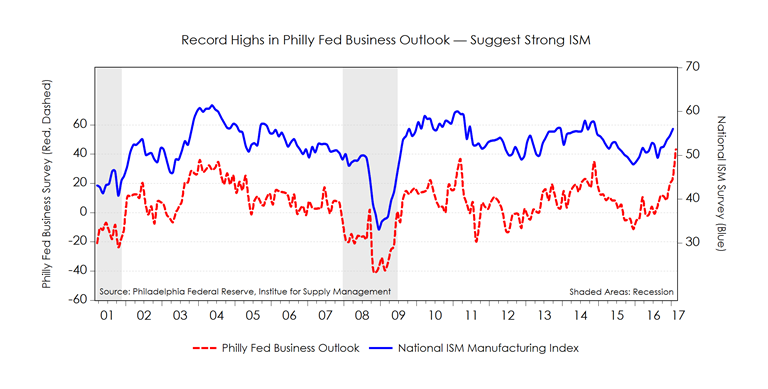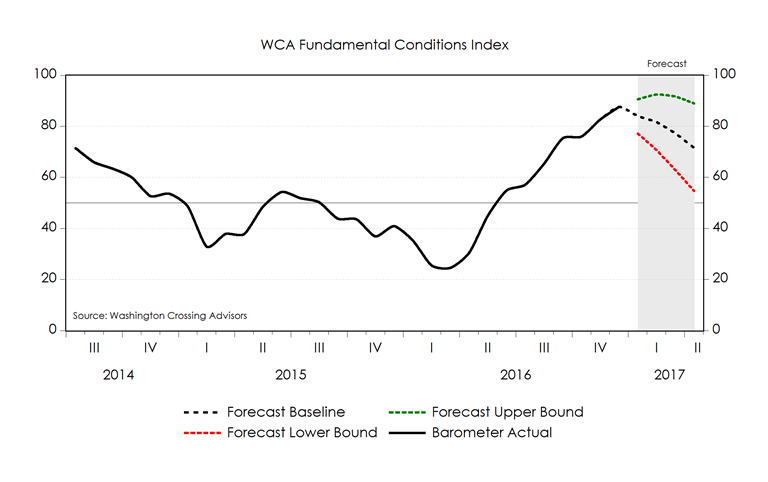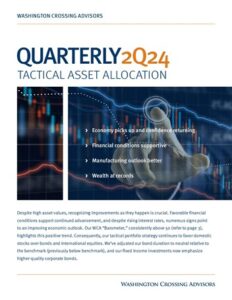Monday Morning Minute 022017
THE WEEK AHEAD
Quiet week on the data front this week, but the Federal Reserve (Fed) releases minutes from their latest meeting.
MACRO VIEW
Last week, the February Philadelphia Business Outlook Survey (BOS) reached 43.3, a level not seen since 1973. The three month moving average rose to 24.9 which was last achieved in 2004 shortly after Congress signed the Jobs and Growth Tax Relief Reconciliation Act of 2003. Both is 1973 and 2004, the economy posted the best growth of the respective decades.
Why is the report important? For one, it focuses on a very important component of the economy — planned business investment. The BOS also ties in well with the Institute for Supply Management’s (ISM) National Manufacturing Index, a good proxy for GDP growth (chart A). While not perfectly correlated, the Philly Fed’s BOS tends to provide some insight into the higher-profile ISM report (due out March 1).
Chart A
We also updated our WCA Fundamental Conditions Barometer, and our forecast of same through April (chart B). Here we also see that most fundamental market and economic conditions point toward growth. After bottoming out a year ago, a pickup in global growth helped drive improving conditions throughout 2016. We expect the pace of growth acceleration to cool somewhat in the months ahead, however.
Chart B
Portfolios remain tactically overweight large-cap domestic stocks versus bonds at this time.
ECONOMIC RELEASES THIS WEEK
| Date | Report | Period | Survey | Prior |
| Monday, Feb 20: | President’s Day: Markets Closed | |||
| Tuesday, Feb 21: | PMI Manufacturing Index Flash | Feb | — | 55.1 |
| Wednesday, Feb 22: | FOMC Minutes | |||
| Existing Home Sales M/M | Jan | — | -2.8% | |
| Existing Home Sales Y/Y | Jan | — | 0.7% | |
| Thursday, Feb 23: | Weekly Jobless Claims | 2/18 | — | 239 K |
| Friday, Feb 24: | New Home Sales | Jan | — | 536 K |
| Consumer Sentiment | Feb | — | 95.7 | |
| Source: Bloomberg |
ASSET ALLOCATION PORTFOLIO POSTURE
Based on shorter-term expectations, the “tactical” allocation within portfolios is underweight bonds / overweight stocks.
Kevin Caron, CFA, Portfolio Manager
Chad Morganlander, Portfolio Manager
Matthew Battipaglia, Analyst
Suzanne Ashley, Junior Analyst
(973) 549-4052
Disclosures
WCA Fundamental Conditions Barometer Description: We regularly assess changes in fundamental conditions to help guide near-term asset allocation decisions. The analysis incorporates approximately 30 forward-looking indicators in categories ranging from Credit and Capital Markets to U.S. Economic Conditions and Foreign Conditions. From each category of data, we create three diffusion-style sub-indices that measure the trends in the underlying data. Sustained improvement that is spread across a wide variety of observations will produce index readings above 50 (potentially favoring stocks), while readings below 50 would indicate potential deterioration (potentially favoring bonds). The WCA Fundamental Conditions Index combines the three underlying categories into a single summary measure. This measure can be thought of as a “barometer” for changes in fundamental conditions.
The information contained herein has been prepared from sources believed to be reliable but is not guaranteed by us and is not a complete summary or statement of all available data, nor is it considered an offer to buy or sell any securities referred to herein. Opinions expressed are subject to change without notice and do not take into account the particular investment objectives, financial situation, or needs of individual investors. There is no guarantee that the figures or opinions forecasted in this report will be realized or achieved. Employees of Stifel, Nicolaus & Company, Incorporated or its affiliates may, at times, release written or oral commentary, technical analysis, or trading strategies that differ from the opinions expressed within. Past performance is no guarantee of future results. Indices are unmanaged, and you cannot invest directly in an index.
Asset allocation and diversification do not ensure a profit and may not protect against loss. There are special considerations associated with international investing, including the risk of currency fluctuations and political and economic events. Investing in emerging markets may involve greater risk and volatility than investing in more developed countries. Due to their narrow focus, sector-based investments typically exhibit greater volatility. Small company stocks are typically more volatile and carry additional risks, since smaller companies generally are not as well established as larger companies. Property values can fall due to environmental, economic, or other reasons, and changes in interest rates can negatively impact the performance of real estate companies. When investing in bonds, it is important to note that as interest rates rise, bond prices will fall. High-yield bonds have greater credit risk than higher-quality bonds. The risk of loss in trading commodities and futures can be substantial. You should therefore carefully consider whether such trading is suitable for you in light of your financial condition. The high degree of leverage that is often obtainable in commodity trading can work against you as well as for you. The use of leverage can lead to large losses as well as gains.
All investments involve risk, including loss of principal, and there is no guarantee that investment objectives will be met. It is important to review your investment objectives, risk tolerance and liquidity needs before choosing an investment style or manager. Equity investments are subject generally to market, market sector, market liquidity, issuer, and investment style risks, among other factors to varying degrees. Fixed Income investments are subject to market, market liquidity, issuer, investment style, interest rate, credit quality, and call risks, among other factors to varying degrees.
This commentary often expresses opinions about the direction of market, investment sector and other trends. The opinions should not be considered predictions of future results. The information contained in this report is based on sources believed to be reliable, but is not guaranteed and not necessarily complete.
Washington Crossing Advisors LLC is a wholly owned subsidiary and affiliated SEC Registered Investment Adviser of Stifel Financial Corp (NYSE: SF).





